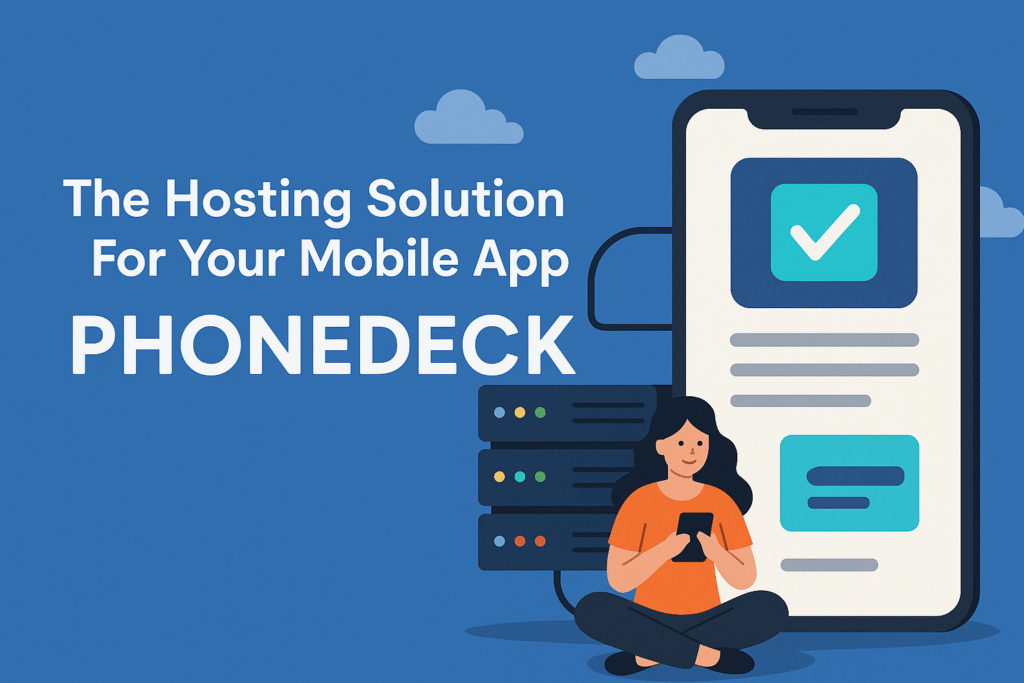The Hosting Solution For Your Mobile App Phonedeck
Let me say this up front—I’ve used a lot of hosting solutions for mobile apps over the years. From Firebase to Heroku, AWS to DigitalOcean. Some were fast but confusing. Others were simple but not built for scale.
That’s why when I stumbled upon Phonedeck back in early 2023, it genuinely felt like a game-changer. I’ve been using it since then across two mobile app projects, and in this review, I’ll break down what makes it tick, what to expect, and how it compares to the usual suspects like Firebase, AWS, and others.
What Is Phonedeck and Who’s It For?
Phonedeck is a backend-as-a-service (BaaS) platform built specifically for mobile apps. It’s designed for developers who want fast deployment, strong security, and zero DevOps overhead.
- Realtime NoSQL database (Mongo-style)
- Built-in API gateway
- Authentication and RBAC
- Cloud hosting with global CDN
If you’ve ever juggled APIs, user auth, and server management, this is the kind of platform that keeps things lean and lets you focus on building features—not putting out fires.
Why Hosting Is the Backbone of a Mobile App
Most developers worry about UI/UX and app store rankings. But your hosting stack is what keeps your app alive during a traffic spike or a cyber attack. Seriously—users won’t care how beautiful your app is if it crashes during login.
In fact, rising acquisition costs make retention even more important. And guess what? Slow hosting kills retention.
My Real Setup with Phonedeck
I used Phonedeck to launch a social productivity app for students. Here’s what my stack looked like:
- Frontend: Flutter (iOS & Android)
- Backend: Node.js (hosted serverless)
- Database: Phonedeck NoSQL
- Auth: Email + OTP + 2FA
- CDN: Phonedeck global edge nodes
The setup time? Barely two hours to go from repo to live staging.
Security Without the Stress
One thing I’ll give Phonedeck major credit for: cybersecurity. This platform doesn’t treat it like an afterthought.
- Zero-trust architecture
- OAuth2 + SSL + JWT tokens
- DDoS mitigation built-in
- Audit logs with event tracking
Cyber attacks on mobile apps are rising fast. Just ask OWASP. With Phonedeck, I sleep easier knowing these layers are baked in—not bolted on later.
In fact, after reading how big players are stepping up security, I realized platforms like Phonedeck are ahead of the curve.
Performance: Surprisingly Fast (Even on Budget Plans)
Before Phonedeck, my API response times in India were hovering around 300ms. Now? Consistently under 150ms. CDN, smart caching, and minimal cold starts make a difference.
And during our social campaign, even with thousands of concurrent users, not a single crash. That alone made it worth it.
What Sets It Apart from Firebase or AWS
| Platform | Pros | Cons |
|---|---|---|
| Firebase | Great documentation, ecosystem | Can get expensive fast, vendor lock-in |
| AWS | Unlimited customization | Steep learning curve, bloated billing |
| Phonedeck | Built-in security, fast deploy, simple pricing | No built-in analytics (I use PostHog) |
That pricing transparency is a lifesaver. You’re not decoding invoices like a tax auditor.
Real Trends in Mobile App Hosting (2025 and Beyond)
If you’re serious about long-term growth, keep an eye on:
- Edge Hosting – low latency for global users
- Serverless Functions – scale automatically, pay less
- Built-in DevSecOps – fewer tools, better coverage
- Bot Protection – trust me, you’ll need it
Need proof? Just look at how download bots are hijacking app growth.
What I Wish Was Better
Alright, it’s not perfect. Here’s my honest take:
- Analytics is missing (solved with PostHog)
- Dashboard feels clunky on mobile
- Free plan is solid for devs, not for full apps
Still, if you’re looking to reduce churn, I’d recommend checking out this guide on user engagement. Because speed is only part of the puzzle.
Verdict: Is Phonedeck Worth It?
For solo developers, startups, and even mid-scale teams, Phonedeck is a hidden gem. It’s fast, secure, and developer-friendly without the AWS learning curve.
Even tablet users with heavy streaming usage saw great performance on our media app.
And let’s be honest—when your backend works, you finally have time to ship updates, fix bugs, and think about growth. Hosting shouldn’t be a stress. And for me, Phonedeck took that weight off.
Want More Growth-Driven Dev Guides?
- How to handle rising acquisition costs
- How app platforms are adapting to privacy trends
- Social media hacks for app growth
Want me to break down other BaaS tools or monetization tactics? Hit me up. This is what I live for.



